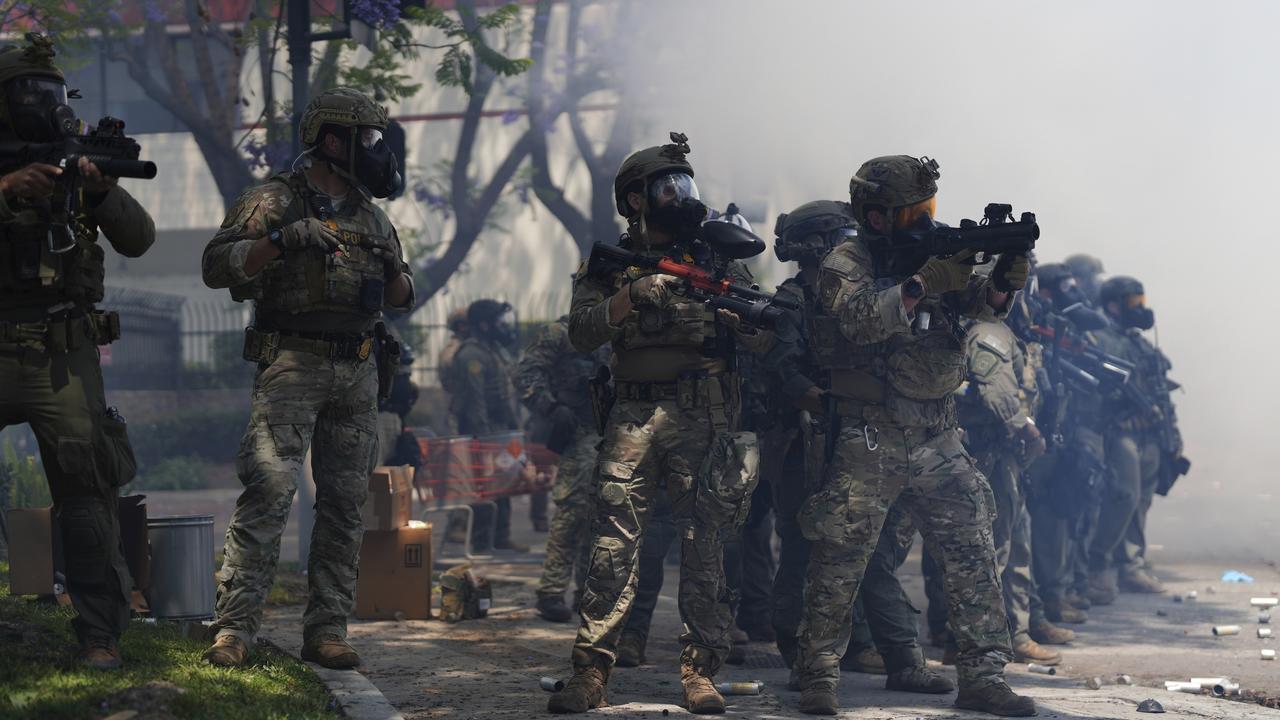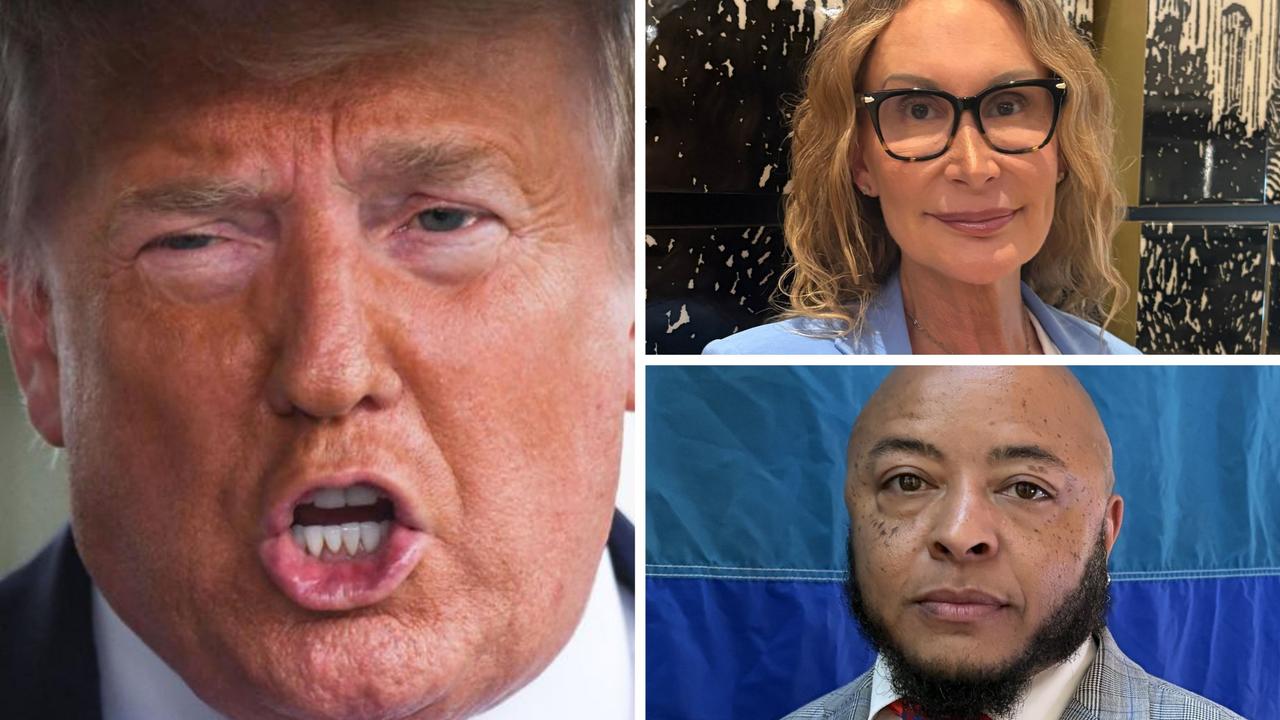Australia joins US, UK in slamming China over Hong Kong security law
Unrest has broken out during Hong Kong’s Tiananmen vigil as protesters defied a police ban and Australia signed a joint statement condemning China’s new security law.
World
Don't miss out on the headlines from World. Followed categories will be added to My News.
Police have fired pepper spray at Hong Kong protesters who were defying a ban to stage candlelit rallies in memory of China’s 1989 Tiananmen Square democracy crackdown while accusing Beijing authorities of stifling their freedoms too.
The scuffles broke out in the working-class Mong Kok district when demonstrators tried to set up roadblocks with metal barriers and officers used spray to disperse them, according to Reuters witnesses.
It was the first time there had been unrest during the annual Tiananmen vigil in Hong Kong, which police had banned this year citing the coronavirus crisis. Several thousand people joined the main rally in Victoria Park, chanting slogans such as “Liberate Hong Kong, revolution of our time” and “Fight for freedom, stand with Hong Kong”.
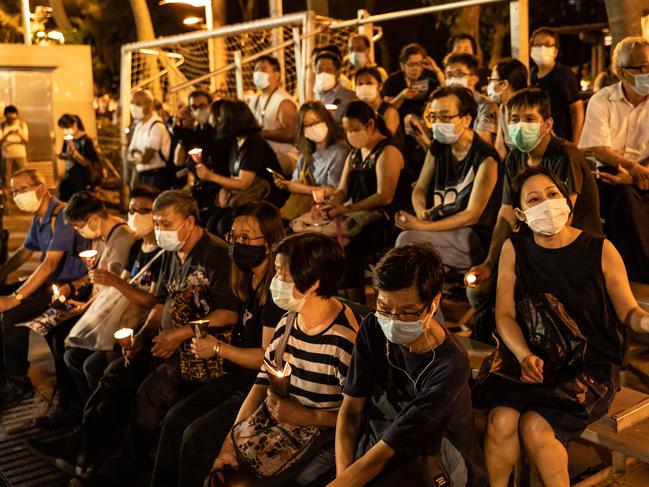
“We are just remembering those who died on June 4, the students who were killed. What have we done wrong? For 30 years we have come here peacefully and reasonably, once it’s over it’s ‘sayonara’ (goodbye),” said Kitty, a 70-year-old housewife.
The anniversary has struck an especially sensitive nerve in the former British- ruled city this year after China’s move last month to impose national security legislation and the passage of a bill outlawing disrespect of China’s national anthem.
It also comes as Chinese media and some Beijing officials voice support for protests in the United States against police brutality.
The Tiananmen crackdown is not officially commemorated in mainland China, where the topic is taboo.
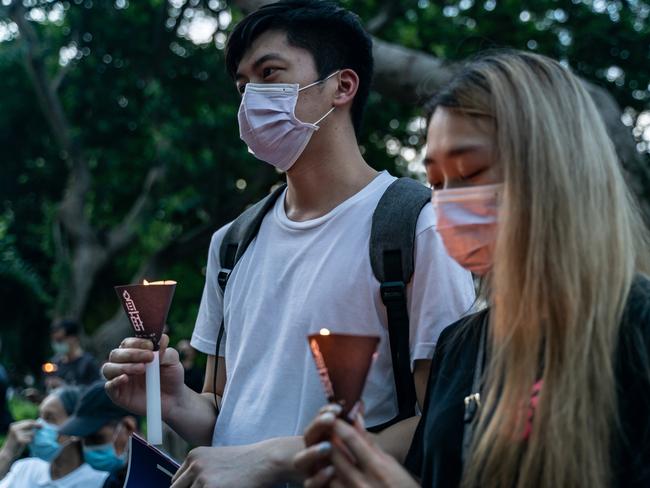
In Beijing, security around Tiananmen Square, a popular tourist attraction in the heart of the city, appeared to be tightened, with more police visible than on ordinary days.
In Hong Kong, which just reported its first locally transmitted coronavirus cases in weeks, police had said a mass gathering would undermine public health. But many took to the streets to light candles and stand for a minute’s silence. Seven Catholic churches opened their doors for memorials.
“We are afraid this will be the last time we can have a ceremony but Hong Kongers will always remember what happened on June 4,” said Brenda Hui, 24, in Mong Kok, where she and a friend stood with a white battery-illuminated umbrella that read “Never Forget June 4”.
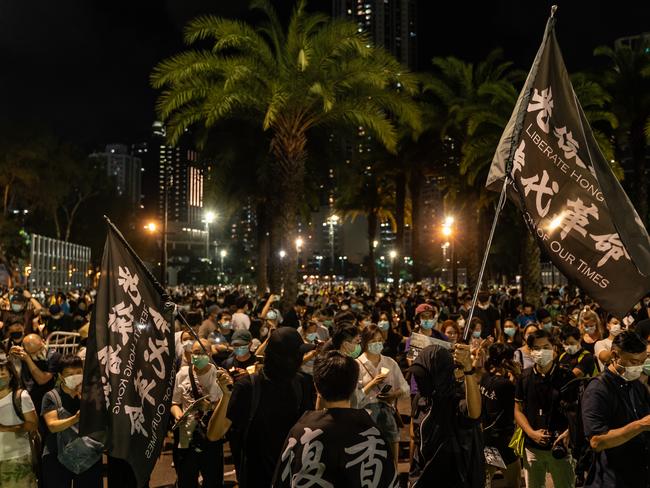
The European Union and United States both expressed solidarity with the Hong Kong demonstrators’ desire to mark the Tiananmen anniversary.
Earlier on Thursday, some students in Hong Kong followed the annual tradition of repainting a Tiananmen memorial message on a university campus bridge: “Souls of martyrs shall forever linger despite the brutal massacre. Spark of democracy shall forever glow for the demise of evil.”
AUSTRALIA JOINS US, UK TO SLAM CHINA OVER CHINA
It comes as Beijing’s new Hong Kong security law was criticised by the Australian, US, Canadian and UK governments.
The four countries issued a joint statement reiterating “deep concern” over the new law, which was passed by China’s rubber stamp parliament Thursday morning (local time).
It came a day after US Secretary of State Mike Pompeo said the US no longer recognised Hong Kong was not independent from China.
Thousands of pro-democracy protesters have returned to Hong Kong streets over the past week after China’s new crackdown began.
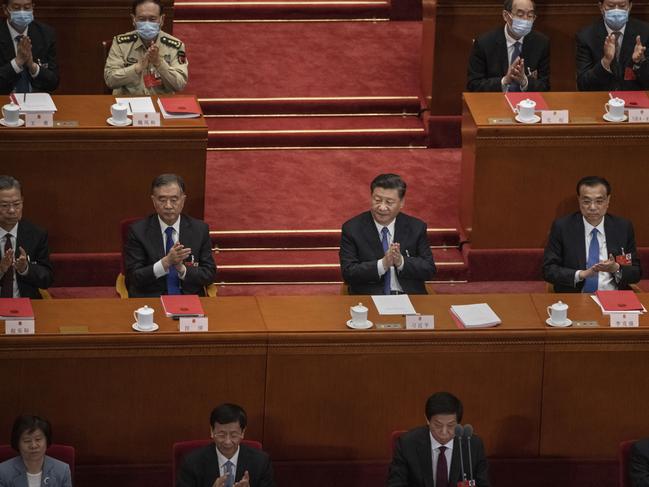
“Hong Kong has flourished as a bastion of freedom,” the joint statement said.
“The international community has a significant and longstanding stake in Hong Kong’s prosperity and stability.”
Beijing’s move threatened the freedom of Hong Kong citizens and the territory’s economic future, the joint statement said.
It said the new law “would curtail the Hong Kong people’s liberties, and in doing so, dramatically erode Hong Kong’s autonomy and the system that made it so prosperous”.
Earlier, China’s parliament endorsed plans to impose the national security law on Hong Kong that critics say will destroy the city’s autonomy.
Over 2800 members of the National People’s Congress (NPC) voted overwhelmingly in favour of the proposal to draft the law, which would punish secession, subversion of state power, terrorism and acts that endanger national security.
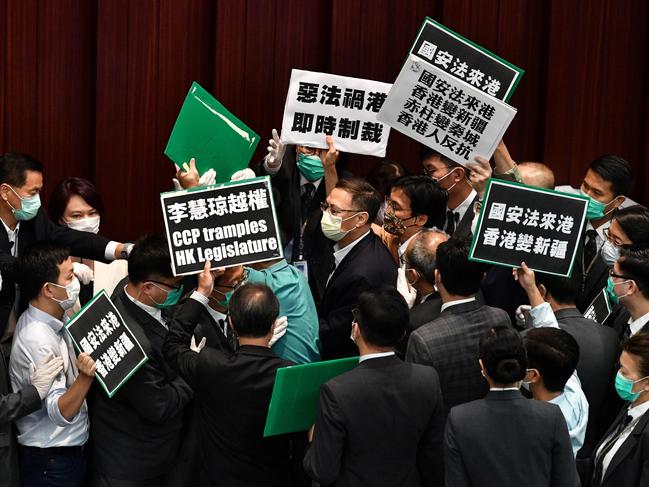
The announcement of the result was met with sustained and loud applause by delegates.
Only one person opposed the proposal, while six abstained.
The law would be directly imposed by mainland authorities, effectively bypassing Hong Kong’s government.
According to a draft of the proposal released last week, the law would allow mainland security agencies to operate openly in Hong Kong.
The NPC Standing Committee – which is likely to meet next in June – will now be tasked with formulating the legislation, which Beijing has said must be done “at an early date”.
The plans have prompted condemnation from foreign governments, investors and Hong Kong’s pro-democracy movement, who say China is eradicating the freedoms it promised the city under its 1997 handover agreement with Britain.
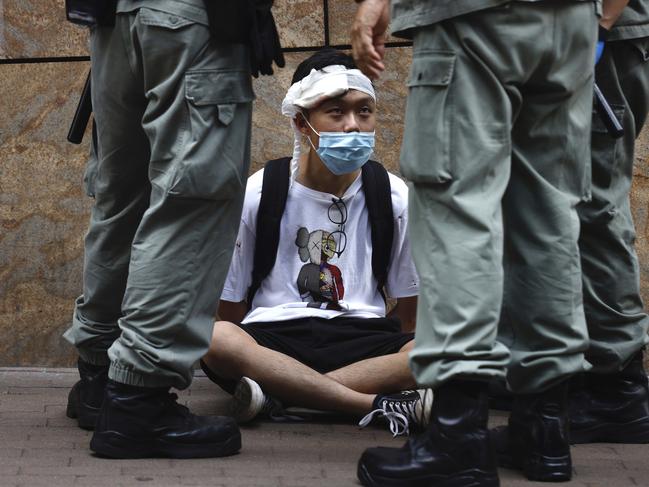
The United States on Wednesday revoked its special status for Hong Kong, alleging the city was no longer autonomous from Beijing, paving the way for future sanctions and the removal of trading privileges in the financial hub.
China has made Hong Kong’s national security law a top priority in this year’s annual parliamentary sessions after huge pro-democracy protests rocked the financial hub for seven months last year.
Last week’s announcement that China would impose the new security law triggered further protests in Hong Kong, although a huge police presence prevented massive gatherings.
NPC Standing Committee Vice Chairman Wang Chen said last week that Hong Kong’s delays in implementing its own security law had forced the Chinese leadership to take action.
“More than 20 years after Hong Kong’s return, however, relevant laws are yet to materialise due to the sabotage and obstruction by those trying to sow trouble in Hong Kong and China at large, as well as external hostile forces,” Wang said.
China has not only refused to address protesters’ concerns, but also routinely attacked them as “anti-China chaotic forces” secretly backed by Western powers, bent on destroying the city and seeking full independence from the mainland.
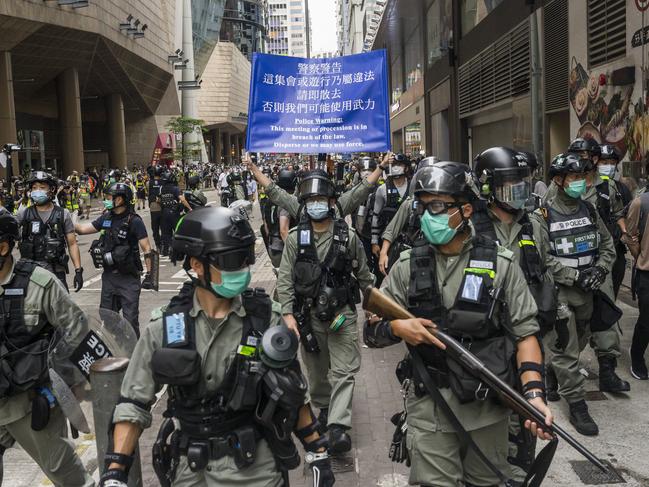
Mainland authorities frequently use the national security law to detain activists, journalists and lawyers under the pretext of “state subversion” – in some cases for several years without trial or access to lawyers.
Several critical details about the law have yet to be clarified – including how it will define crimes as well as “foreign interference”, whether offenders would be tried in Hong Kong or China, whether Hong Kong’s foreign judges will be allowed to decide national security cases, and whether the law would be retroactive.
Mr Pompeo declared China’s moves to curb the freedoms of Hong Kong citizens meant the island territory is no longer independent of the communist nation – meaning it will lose special trade status with America, jeopardising billions of dollars in business.
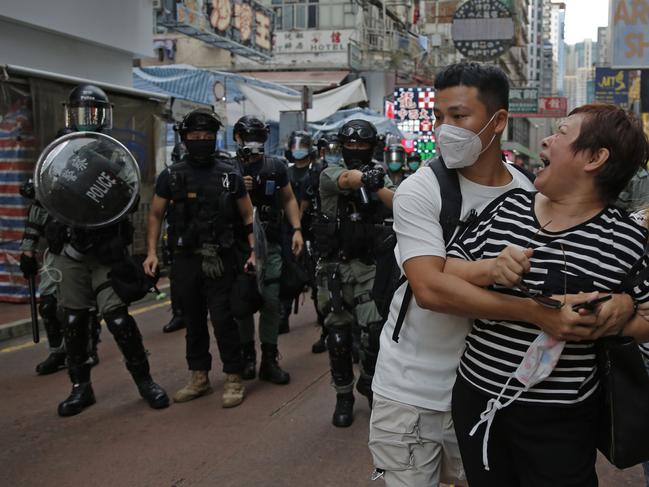
This sets the stage for the US to withdraw preferential trade and financial status the former British colony has enjoyed since it reverted to Chinese rule in 1997.
“Beijing’s disastrous decision is only the latest in a series of actions that fundamentally undermine Hong Kong’s autonomy and freedoms and China’s own promises to the Hong Kong people under the Sino-British Joint Declaration, a UN-filed international treaty,” Mr Pompeo said.
“Hong Kong does not continue to warrant treatment under United States laws in the same manner as US laws were applied to Hong Kong before July 1997.”
Mr Pompeo had initially delayed the report, saying the US was waiting to see the session of China’s rubberstamp parliament.
Mr Pompeo said the new laws would be a “death knell” for Hong Kong, which has had liberties under a semi-autonomous system of governance that does not exist in mainland China, including freedoms of speech, the press and assembly, as well as an independent judiciary.
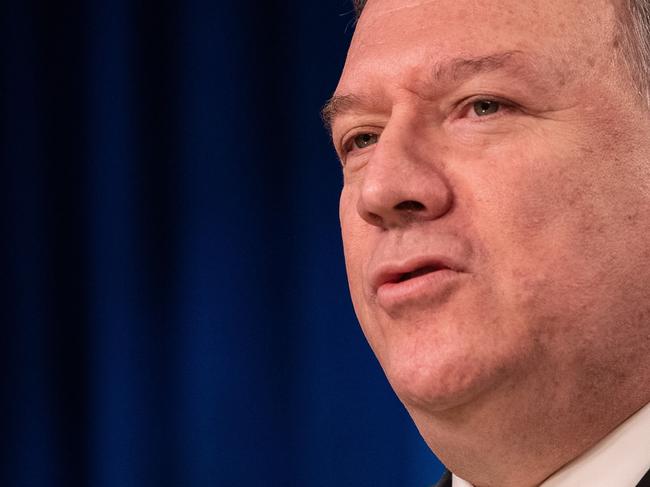
He issued a statement after President Donald Trump threatened that Hong Kong would lose its status as a global financial centre if China imposed its new national law on the island territory.
“No reasonable person can assert today that Hong Kong maintains a high degree of autonomy from China, given facts on the ground,” Mr Pompeo said in a statement.
Today, I reported to Congress that Hong Kong is no longer autonomous from China, given facts on the ground. The United States stands with the people of Hong Kong.
— Secretary Pompeo (@SecPompeo) May 27, 2020
Government officials from the communist state which has faced international condemnation over the coronavirus pandemic announced new laws to stamp out the pro-democracy protests which raged in Hong Kong.
Pro-democracy advocates said that such a move goes against the “one country, two systems” framework that promises freedoms to residents in Hong Kong not available to Chinese citizens in the mainland.
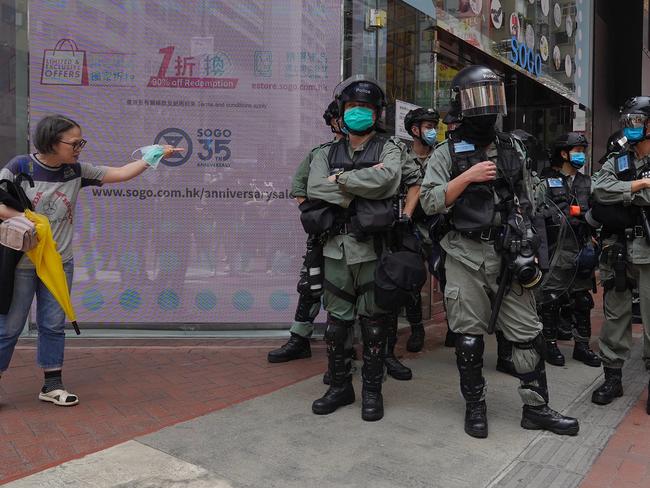
Earlier, thousands of protesters shouted pro-democracy slogans and insults at police in Hong Kong as politicians debated a bill criminalising abuse of the Chinese national anthem in the city.
The bill would make it illegal to insult or abuse the Chinese national anthem, “March of the Volunteers” in semi- autonomous Hong Kong.
RIOT POLICE, RAZOR WIRE FOR PROTESTERS
In the past week, riot police took up posts around Hong Kong’s legislature ahead of expected protests.
Demonstrators were protesting against a bill criminalising disrespect of China’s national anthem and also against Beijing’s plans to impose national security laws.
The national security laws have triggered the first big street unrest in Hong Kong since last year, when violent protests brought the city’s biggest crisis since the return of Chinese rule from Britain in 1997.
Activists say the security laws could bring an end to Hong Kong’s autonomy, now guaranteed under a policy known as “one country, two systems”.
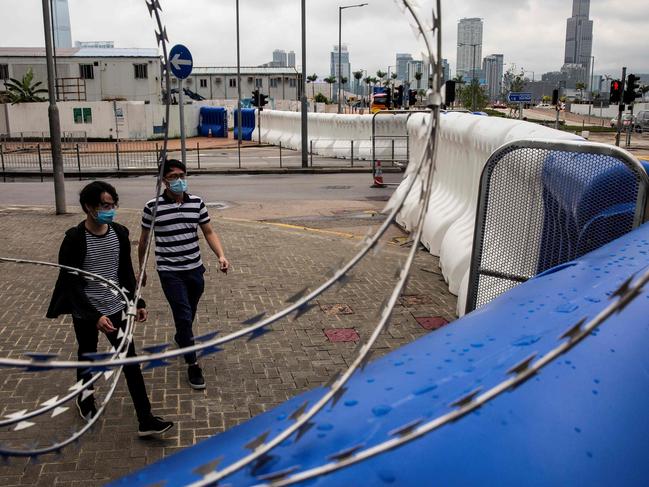
Diplomats, trade bodies and investors have also voiced alarm.
Thousands of protesters clashed with police on Sunday in the first big demonstrations since last year.
As he headed into the metro station next to the Legislative Council, known as Legco, 23-year-old Kevin said he was worried about what he called increasing Beijing assertiveness.
“The idea of one country, two systems is broken,” he said.
“China said it would stick to that agreement, but that’s not the case.”
Authorities erected a wall of two-metre white-and-blue plastic barriers filled with water around Legco, extending across a nearby park up to the picturesque Victoria Harbour.
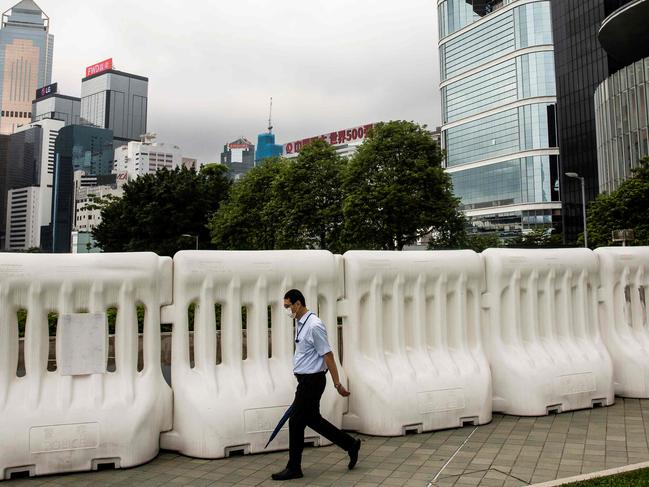
Around midnight, riot police roamed the park, with squads stationed outside Legco and the neighbouring Central Government Offices building.
Several police vans were parked on nearby roads.
The anthem bill is set for a second reading and is expected to be turned into law next month.
It requires China’s March of the Volunteers to be taught in schools and sung by organisations, and imposes jail terms or fines on those who disrespect it.
Opponents say the bill represents another example of Beijing encroaching on Hong Kong, while supporters say the city has a duty to ensure national symbols are treated respectfully.
Hong Kong and Beijing authorities have issued repeated statements insisting there is no risk to the city’s high degree of autonomy, urging patience until the laws are finalised.
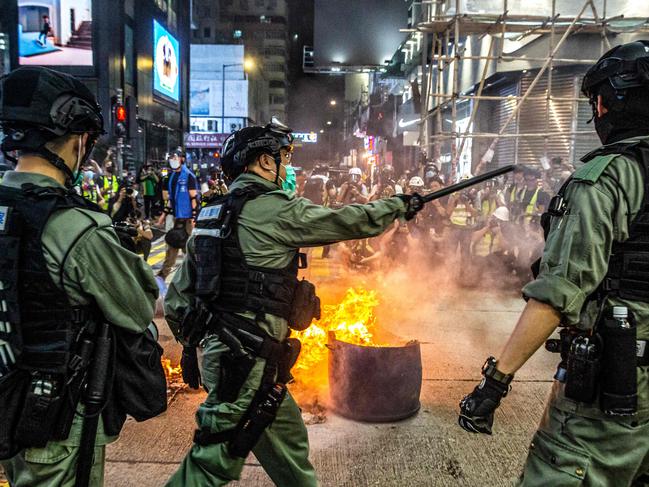
Hong Kong police issued a warning late on Tuesday that they would not tolerate disruptions to public order, after activists circulated calls online for protests on Wednesday.
The security legislation could pave the way for mainland security agencies to open up branches in the global financial hub.
It targets secession, subversion, terrorism and foreign interference – terms that are increasingly used by authorities to describe last year’s pro-democracy protests.
CHINA TELLS US TO BUTT OUT OF HK
Earlier in the week, China threatened counter measures against the United States if it was punished for plans to impose a sedition law on Hong Kong, that the business hub’s security chief hailed as a new tool that would defeat “terrorism”.
As police dispersed the crowds with tear gas and water cannon, Washington’s national security adviser Robert O’Brien warned the new law could cost the city its preferential US trading status.
But China’s foreign ministry said Beijing would react to any sanctions from Washington.
“If the US insists on hurting China’s interests, China will have to take every necessary measure to counter and oppose this,” foreign ministry spokesman Zhao Lijian told reporters on Monday.
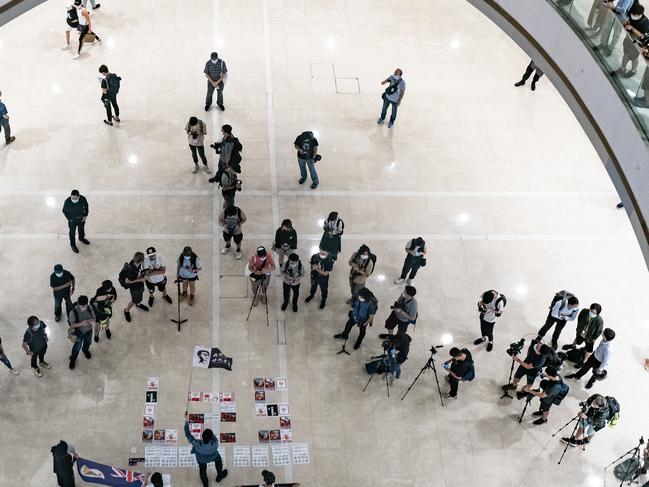
Hong Kong has become the latest flashpoint in soaring tensions between the world’s two super powers which China has likened to “the brink of a new Cold War”.
The refusal to grant Hong Kongers democracy has sparked rare bipartisan support in an otherwise bitterly divided Washington during the Trump administration.
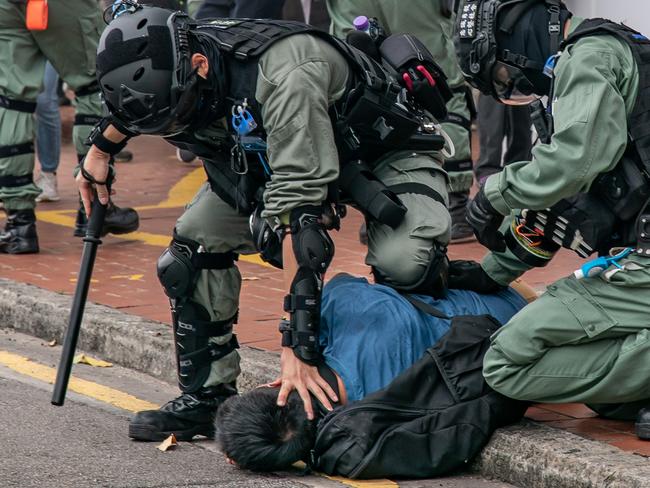
Beijing portrays the city’s protests as a foreign-backed plot to destabilise the motherland and says other nations have no right to interfere in how the international business hub is run.
Protesters, who have hit the streets in their millions, say they are motivated by years of Beijing chipping away at the city’s freedoms since it was handed back to China by Britain in 1997.
Hong Kong enjoys liberties unseen on the mainland, as well as its own legal system and trade status.
Campaigners view the security law proposal as the most brazen move yet by Beijing to end free speech and the city’s ability to make its own laws.
Of particular concern is a provision allowing Chinese security agents to operate in Hong Kong, with fears it could spark a crackdown on those voicing dissent against China’s communist rulers.
On the mainland, subversion laws are routinely wielded against critics.
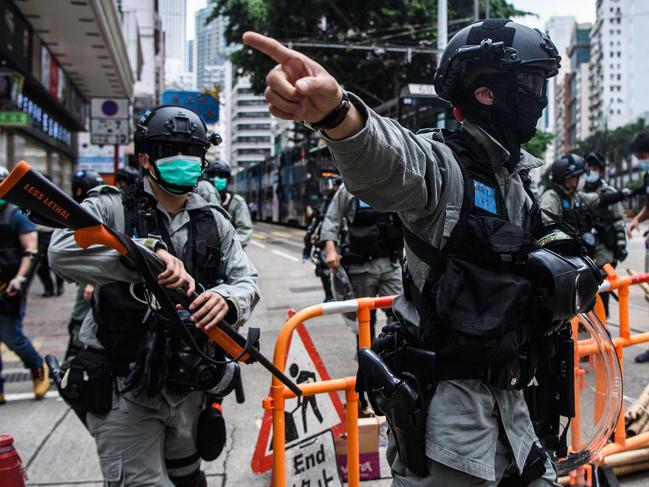
The city’s influential Bar Association on Monday described the proposed motion as “worrying and problematic” — and warned it may even breach the territory’s mini-constitution.
The proposal has spooked investors with Hong Kong’s stock exchange suffering its largest drop in five years on Friday.
On Monday it had yet to recover, closing just 0.10 per cent up.
Hong Kong’s unpopular pro-Beijing government has welcomed the law.
“Terrorism is growing in the city and activities which harm national security, such as ‘Hong Kong independence’, become more rampant,” security minister John Lee said in a statement welcoming the planned legislation.
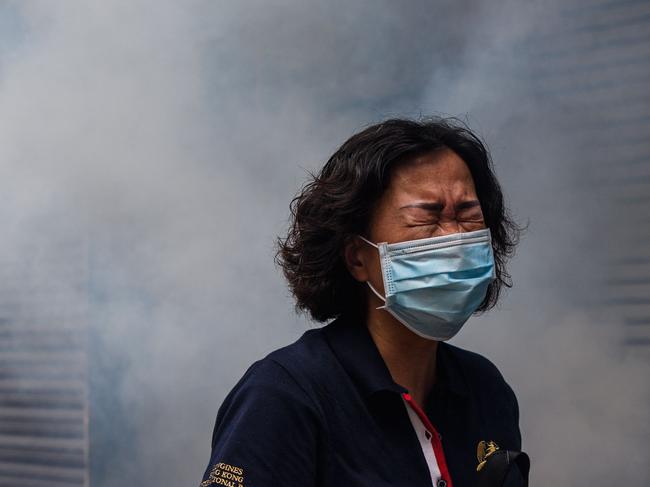
Police chief Chris Tang cited 14 recent cases where explosives had been seized and said the new law would “help combat the force of ‘Hong Kong independence’ and restore social order”.
Last year’s protests were initially sparked by plans to allow extraditions to the mainland but soon snowballed into a popular revolt against Beijing and the city’s police force.
Beijing has dismissed protester demands for an inquiry into the police, amnesty for the 8,500 people arrested and universal suffrage.
The demonstrations fizzled at the start of the year as mass arrests and the coronavirus took their toll.
But they have rekindled in recent weeks with Sunday’s rally producing the most intense clashes for months and police making at least 120 arrests.
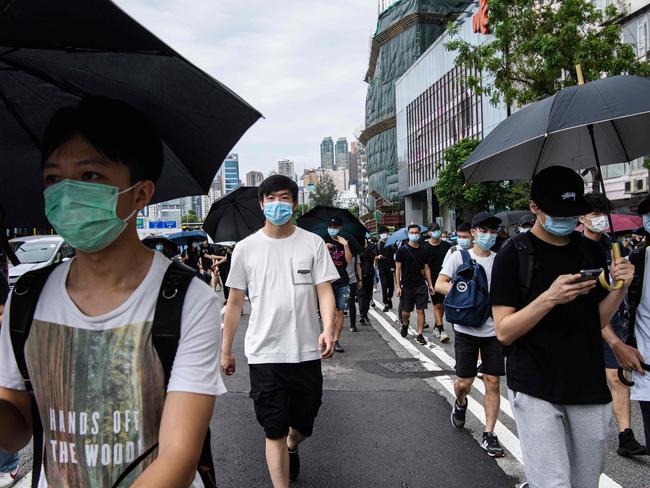
During last year’s huge pro-democracy rallies, mob attacks were common on both sides of the political divide and a video of protesters beating a lawyer at Sunday’s rally was seized on by China’s state media.
Hu Xijin, editor-in-chief of the nationalist tabloid Global Times, posted the video on Twitter — a platform banned in mainland China.
“Let’s see what the Washington-backed Hong Kong democracy really looks like,” he wrote.
Originally published as Australia joins US, UK in slamming China over Hong Kong security law

